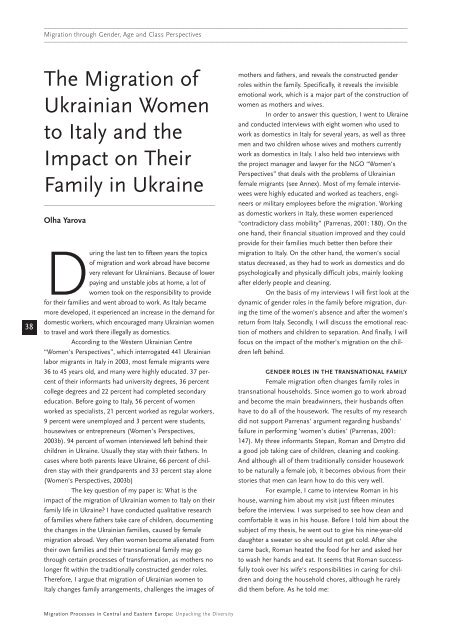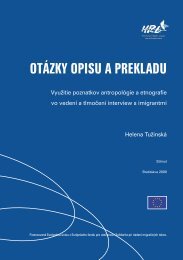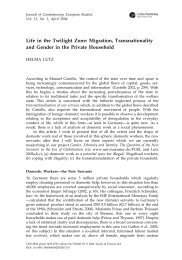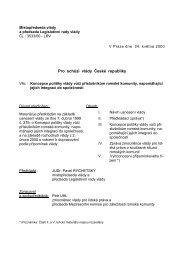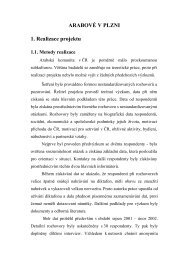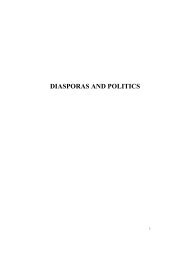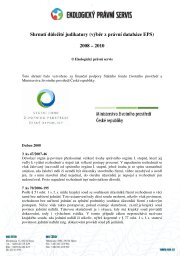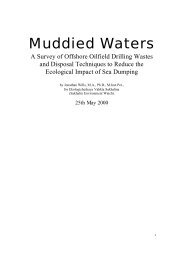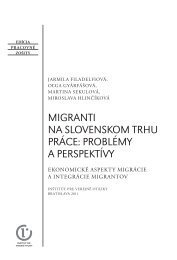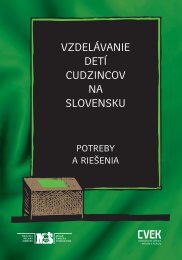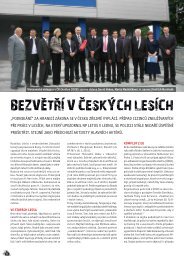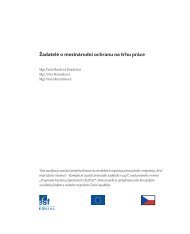Migration Processes in Central and Eastern Europe - Multiple Choices
Migration Processes in Central and Eastern Europe - Multiple Choices
Migration Processes in Central and Eastern Europe - Multiple Choices
Create successful ePaper yourself
Turn your PDF publications into a flip-book with our unique Google optimized e-Paper software.
———————————————————————————————————————————————————————————————<br />
<strong>Migration</strong> through Gender, Age <strong>and</strong> Class Perspectives<br />
———————————————————————————————————————————————————————————————<br />
38<br />
The <strong>Migration</strong> of<br />
Ukra<strong>in</strong>ian Women<br />
to Italy <strong>and</strong> the<br />
Impact on Their<br />
Family <strong>in</strong> Ukra<strong>in</strong>e<br />
—————————————————————————————<br />
Olha Yarova<br />
Dur<strong>in</strong>g the last ten to fifteen years the topics<br />
of migration <strong>and</strong> work abroad have become<br />
very relevant for Ukra<strong>in</strong>ians. Because of lower<br />
pay<strong>in</strong>g <strong>and</strong> unstable jobs at home, a lot of<br />
women took on the responsibility to provide<br />
for their families <strong>and</strong> went abroad to work. As Italy became<br />
more developed, it experienced an <strong>in</strong>crease <strong>in</strong> the dem<strong>and</strong> for<br />
domestic workers, which encouraged many Ukra<strong>in</strong>ian women<br />
to travel <strong>and</strong> work there illegally as domestics.<br />
Accord<strong>in</strong>g to the Western Ukra<strong>in</strong>ian Centre<br />
“Women's Perspectives”, which <strong>in</strong>terrogated 441 Ukra<strong>in</strong>ian<br />
labor migrants <strong>in</strong> Italy <strong>in</strong> 2003, most female migrants were<br />
36 to 45 years old, <strong>and</strong> many were highly educated. 37 percent<br />
of their <strong>in</strong>formants had university degrees, 36 percent<br />
college degrees <strong>and</strong> 22 percent had completed secondary<br />
education. Before go<strong>in</strong>g to Italy, 56 percent of women<br />
worked as specialists, 21 percent worked as regular workers,<br />
9 percent were unemployed <strong>and</strong> 3 percent were students,<br />
housewives or entrepreneurs (Women's Perspectives,<br />
2003b). 94 percent of women <strong>in</strong>terviewed left beh<strong>in</strong>d their<br />
children <strong>in</strong> Ukra<strong>in</strong>e. Usually they stay with their fathers. In<br />
cases where both parents leave Ukra<strong>in</strong>e, 66 percent of children<br />
stay with their gr<strong>and</strong>parents <strong>and</strong> 33 percent stay alone<br />
(Women's Perspectives, 2003b)<br />
The key question of my paper is: What is the<br />
impact of the migration of Ukra<strong>in</strong>ian women to Italy on their<br />
family life <strong>in</strong> Ukra<strong>in</strong>e? I have conducted qualitative research<br />
of families where fathers take care of children, document<strong>in</strong>g<br />
the changes <strong>in</strong> the Ukra<strong>in</strong>ian families, caused by female<br />
migration abroad. Very often women become alienated from<br />
their own families <strong>and</strong> their transnational family may go<br />
through certa<strong>in</strong> processes of transformation, as mothers no<br />
longer fit with<strong>in</strong> the traditionally constructed gender roles.<br />
Therefore, I argue that migration of Ukra<strong>in</strong>ian women to<br />
Italy changes family arrangements, challenges the images of<br />
mothers <strong>and</strong> fathers, <strong>and</strong> reveals the constructed gender<br />
roles with<strong>in</strong> the family. Specifically, it reveals the <strong>in</strong>visible<br />
emotional work, which is a major part of the construction of<br />
women as mothers <strong>and</strong> wives.<br />
In order to answer this question, I went to Ukra<strong>in</strong>e<br />
<strong>and</strong> conducted <strong>in</strong>terviews with eight women who used to<br />
work as domestics <strong>in</strong> Italy for several years, as well as three<br />
men <strong>and</strong> two children whose wives <strong>and</strong> mothers currently<br />
work as domestics <strong>in</strong> Italy. I also held two <strong>in</strong>terviews with<br />
the project manager <strong>and</strong> lawyer for the NGO “Women's<br />
Perspectives” that deals with the problems of Ukra<strong>in</strong>ian<br />
female migrants (see Annex). Most of my female <strong>in</strong>terviewees<br />
were highly educated <strong>and</strong> worked as teachers, eng<strong>in</strong>eers<br />
or military employees before the migration. Work<strong>in</strong>g<br />
as domestic workers <strong>in</strong> Italy, these women experienced<br />
“contradictory class mobility” (Parrenas, 2001: 180). On the<br />
one h<strong>and</strong>, their f<strong>in</strong>ancial situation improved <strong>and</strong> they could<br />
provide for their families much better then before their<br />
migration to Italy. On the other h<strong>and</strong>, the women's social<br />
status decreased, as they had to work as domestics <strong>and</strong> do<br />
psychologically <strong>and</strong> physically difficult jobs, ma<strong>in</strong>ly look<strong>in</strong>g<br />
after elderly people <strong>and</strong> clean<strong>in</strong>g.<br />
On the basis of my <strong>in</strong>terviews I will first look at the<br />
dynamic of gender roles <strong>in</strong> the family before migration, dur<strong>in</strong>g<br />
the time of the women's absence <strong>and</strong> after the women's<br />
return from Italy. Secondly, I will discuss the emotional reaction<br />
of mothers <strong>and</strong> children to separation. And f<strong>in</strong>ally, I will<br />
focus on the impact of the mother's migration on the children<br />
left beh<strong>in</strong>d.<br />
GENDER ROLES IN THE TRANSNATIONAL FAMILY<br />
Female migration often changes family roles <strong>in</strong><br />
transnational households. S<strong>in</strong>ce women go to work abroad<br />
<strong>and</strong> become the ma<strong>in</strong> breadw<strong>in</strong>ners, their husb<strong>and</strong>s often<br />
have to do all of the housework. The results of my research<br />
did not support Parrenas' argument regard<strong>in</strong>g husb<strong>and</strong>s'<br />
failure <strong>in</strong> perform<strong>in</strong>g 'women's duties' (Parrenas, 2001:<br />
147). My three <strong>in</strong>formants Stepan, Roman <strong>and</strong> Dmytro did<br />
a good job tak<strong>in</strong>g care of children, clean<strong>in</strong>g <strong>and</strong> cook<strong>in</strong>g.<br />
And although all of them traditionally consider housework<br />
to be naturally a female job, it becomes obvious from their<br />
stories that men can learn how to do this very well.<br />
For example, I came to <strong>in</strong>terview Roman <strong>in</strong> his<br />
house, warn<strong>in</strong>g him about my visit just fifteen m<strong>in</strong>utes<br />
before the <strong>in</strong>terview. I was surprised to see how clean <strong>and</strong><br />
comfortable it was <strong>in</strong> his house. Before I told him about the<br />
subject of my thesis, he went out to give his n<strong>in</strong>e-year-old<br />
daughter a sweater so she would not get cold. After she<br />
came back, Roman heated the food for her <strong>and</strong> asked her<br />
to wash her h<strong>and</strong>s <strong>and</strong> eat. It seems that Roman successfully<br />
took over his wife's responsibilities <strong>in</strong> car<strong>in</strong>g for children<br />
<strong>and</strong> do<strong>in</strong>g the household chores, although he rarely<br />
did them before. As he told me:<br />
<strong>Migration</strong> <strong>Processes</strong> <strong>in</strong> <strong>Central</strong> <strong>and</strong> <strong>Eastern</strong> <strong>Europe</strong>: Unpack<strong>in</strong>g the Diversity


